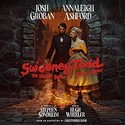|
 SWEENEY TODD SWEENEY TODD
THE DEMON BARBER OF FLEET STREET
2023 BROADWAY REVIVAL CAST
Arts Music/ Reprise Records
Digital [CD release later this year]
Some musicals have "staying power." Let's start with an interesting coincidence; during the same week in March 1979, two musicals set in London in the 1800s–each having as its title character a man who commits murders by slitting his victims' throats–had their American debuts. Based on a notorious true chapter of crime history, a song-filled show about Jack the Ripper (one of several that have come along) had run in England before it bowed in the United States, but I'm sure you're more familiar with the reputation of the other show that showed up in '79 which has seen productions in both countries (and around the world): Once you've been thrilled or scared or moved by Sweeney Todd, the impact is not easily forgotten. And it has stayed on the radar with all the productions, a performance filmed for broadcast on public TV stations, a movie version, and quite a few resulting cast recordings, plus some of the songs from Stephen Sondheim's score that appear on other recordings. The tender "Not While I'm Around" is the most frequent ongoing choice; in the past year alone, it's been on new releases reviewed here by Jack Jones, Linda Purl, and Eleri Ward–plus a revisit on Sondheim Unplugged, Volume 3 by the first man to sing it on Broadway: Ken Jennings. The man doing a creditable job following in his footsteps in the role of Tobias in the 2023 revival's cast recording, the likable Gaten Matarazzo–like most of his co-stars–wasn't born when Sweeney Todd first came along. (His 21st birthday coincided with last Friday's release date of the new digital cast recording.)
It may not seem as harrowing as other versions, but this latest revival of the gripping musical holds our interest and we hold our breath when there's an uptick in tension and terror. Listening to Josh Groban in the title role, he does not sound as darkly intense, tightly wound or as frequently an intimidating loose cannon as other Sweeneys. His strong singing voice is his strong suit, as he handles the range and grandness of melodies with aplomb. The character's rage and resentment are more muted. But never fear that there's minimal fear factor, because there's mega-menace and melodrama ever-present in those invaluable, detailed and dazzling 1979 Jonathan Tunick orchestrations for a 26-piece orchestra. They carry so much of the burden for the chilling, churning foreboding of the roller coaster ride.
As Mr. Todd's partner in crime, Annaleigh Ashford is a quirky, kinetic Mrs. Lovett. At times her approach feels like an "on your mark, get set, go" race that sometimes (at least without the visual performance) seems to be a series of hit-and-miss hunts to find any moment with potential to be glib, goofy, get a laugh at the expense of minimizing the more conniving, selfish and burdened aspects of the woman she's playing. The accent may seem distractingly studied or odd, causing a listener to miss some words or jokes. She can be fun and frolicsome, her bubbly high spirits are a definite contrast in energy to the dire and dour surroundings.
Other cast members generally stay in lanes similar to those paved by early inhabitants of their roles. With her versatile voice changing timbre on a dime, Ruthie Ann Miles is an asset as the Beggar Woman, whose worried warnings and pleadings go unheeded. Maria Bilbao does nicely in the ingenue role of Johanna, both with her "Green Finch and Linnet Bird" solo and interacting–in infatuation and comical panic modes–with Jordan Fisher, who is a suitable suitor. He is more low-key than impassioned at times. It goes with other approaches here that mostly resist making the dramatis personae outsized personalities with huge emotions on parade.
Other cast recordings of Sweeney Todd: The Demon Barber of Fleet Street have the benefit of the presence of some material from Sondheim's score and Hugh Wheeler's book that are absent in this treatment (the "Wigmaker" sequence, the fuller versions of the "Parlour Songs" and Pirelli contest scene, the Judge's "Mea Culpa"). As a major fan of the score, I miss what's missing.
This musical that has made audiences shudder, gasp, laugh, and think will undoubtedly be around to do the same with many productions to come. Like those who love exploring its numerous treatments in person and on recordings, I have logged frequent flyer miles hovering over Fleet Street, knowing full well to keep my seatbelt fastened, due to turbulence.
|
|